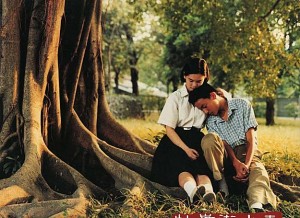Edward Yang has died at 59
Posted By Jonathan Rosenbaum on 07.02.07 at 02:49 PM
First Ousmane Sembene, the father of African cinema, who passed away at age 84 on June 9, and now the Taiwanese master Edward Yang. We’re losing our giants.
Many of Sembene’s major literary works are out of print (including Tribal Scars, a wonderful collection of stories that includes “The Promised Land,” which his first feature, Black Girl, was based on; purchasing this essential paperback on Amazon now costs about $49). Only four of his ten features are available on English-subtitled DVDs, all of them recent releases. Even Black Girl, the one that still moves me the most, is available only in an imperfect copy. (The film’s color sequence, which I’ve never seen in color, is printed in black and white.)
The situation regarding Edward Yang’s films is even worse: only the last of his seven features, albeit one of the best, Yi Yi, is available on Amazon. The one I consider his greatest, A Brighter Summer Day (pictured) can be found extralegally or semilegally from at least a couple of different sources, as I explain in my current DVD column in the summer issue of Cinema Scope. The others, so far as I can tell, are still harder to find. I especially treasure Yang’s 1985 Taipei Story, which features a striking performance by director Hou Hsiao-hsien, and his misunderstood and underrated 1996 Mahjong, the most devastating portrait of the ravages of capitalism on contemporary Taiwan that I know of.
I’m glad I was able to spend some time with Edward when he came to Chicago for a retrospective of his films at the Film Center (before it was the Gene Siskel Film Center) in late 1997 — one of the few such retrospectives he had anywhere, to the best of my knowledge. Reflecting on why so many of his films should remain out of reach, I’m reminded of the little-known fact that a surprisingly large amount of the art cinema of both Taiwan and Hong Kong is financed by gangsters — or so it would appear, according to some of my more knowledgeable friends — which may or may not help to explain such anomalies as his films remaining inaccessible. It’s also worth noting that with a few notable exceptions (e.g., Hou’s City of Sadness), most Taiwanese art films, including those of Tsai Ming-liang, barely have commercial runs of any kind in Taiwan. If I’m not mistaken, Tsai’s What Time Is It There? ran in Taipei for less than a week.


